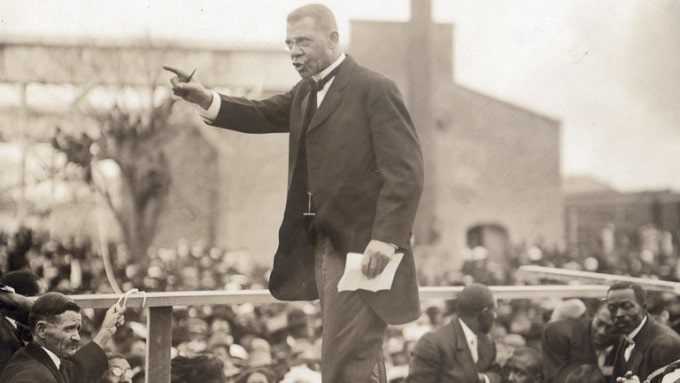*Atlanta Compromise*

Conceived a slave on a Virginia cultivate, Washington (1856-1915) rose to wind up a standout amongst the most compelling African-American educated people of the late nineteenth century. In 1881, he established the Tuskegee Institute, a dark school in Alabama dedicated to preparing educators. Washington was additionally behind the development of the National Negro Business League 20 years after the fact, and he filled in as a consultant to Presidents Theodore Roosevelt and William Howard Taft. Despite the fact that Washington conflicted with other dark pioneers, for example, W. E. B. Du Bois and drew anger for his appearing acknowledgment of isolation, he is perceived for his instructive progressions and endeavors to advance financial confidence among African Americans.
Over the scene of the most anguished time of American race relations (1895-1915) walked the confident and powerful Booker T. Washington. The premier dark instructor, control intermediary, and organization manufacturer of his opportunity, Washington in 1881 established Tuskegee Institute, a dark school in Alabama devoted to mechanical and moral training and to the preparation of state-funded teachers. From his southern residential community base, he made a national political system of schools, daily papers, and the National Negro Business League (established in 1901). In light of the period of Jim Crow, Washington offered the tenet of a settlement, submitting in social and political disparity for blacks while preparing them for financial self-assurance in the modern expressions.
Conceived as a slave on a little homestead in western Virginia, Washington was nine years of age when the Civil War finished. His humble however stern raising incorporated his working in a salt heater when he was ten and filling in as a houseboy for a white family where he initially took in the temperances of cheapness, tidiness, and individual ethical quality. Washington was taught at Hampton Institute, one of the most punctual freedmen's schools committed to mechanical instruction; Hampton was the model whereupon he based his foundation in Tuskegee. Growing up amid Reconstruction and saturated with moral instead of scholarly preparing, he came to trust that after war social elevate had started at the wrong end: the procurement of political and social liberties as opposed to financial self-assurance.
Washington's rationality and the "Tuskegee machine" won him across the board bolster among northern white givers and recognition among blacks. In his Atlanta Compromise address, conveyed at the Cotton States Exposition in 1895, he struck the keynotes of racial accommodationism: "Cast down your pails where you are," Washington asked blacks. "In everything that is simply social," he reported to mindful whites, "we can be as discrete as the fingers, yet one as the turn in everything fundamental to shared advance." His altogether common, antilabor, antidemocratic claim remained for a considerable length of time as an underwriting of isolation. He supported his energy as an instructive statesman by some merciless and tricky strategies. Opponent dark daily papers, instructors, and masterminds were every now and again threatened by his image of manager governmental issues. Dark daily paper editors and trying youthful educated people gambled segregation and joblessness in the event that they grasped political activism instead of Washington's accommodationist social strategy. Such question surfaced particularly in the popular level-headed discussion amongst Washington and W. E. B. Du Bois over the points of "mechanical" instead of "established" training among blacks.
Developing a highly contrasting resistance to Washington's quiet submission in disfranchisement and Jim Crow prompted the arrangement of the Niagara Movement(1905-1909) and the naacp, lobbyist associations working for common and political rights and in addition against lynching. Unexpectedly, Washington additionally worked furtively against Jim Crow laws and racial brutality, composing letters in code names and shielding blacks from lynch crowds, however, these endeavors were seldom known time permitting.
Washington was a logical thinker who occupied with ponder uncertainty so as to manage white acknowledgment of his authority. Such permeability won him global distinction and the part of dark counsel to Presidents Theodore Roosevelt and William Howard Taft. His generally read life account, Up from Slavery (1901), remains as a great in the class of stories by American independent men, and additionally the prime hotspot for Washington's social and recorded reasoning. His racial reasoning did not long survive his passing, but rather in principle and practice, his perspectives on monetary independence have stayed one of the most profound strains in an Afro-American idea.
Cheers!